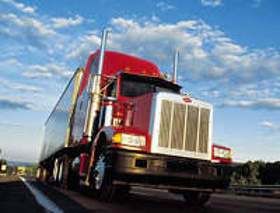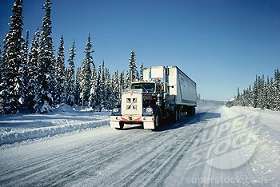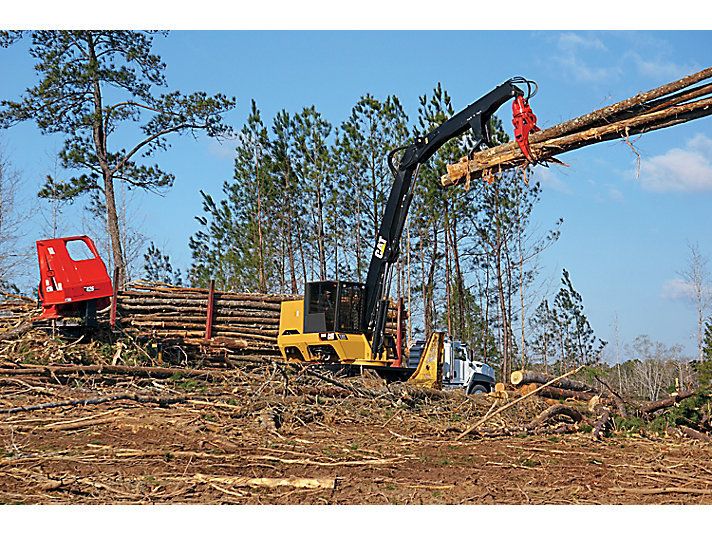Log Trucks
Topic 14151 | Page 1
I have no experience with them. However, most of the job postings I've seen in Oregon want 2 to 5 years OTR or similar experience. The only reference I've seen for pay is in the $15-17 range. I'm still in my 1st year OTR so I haven't pursued it further.
OTR:
Over The Road
OTR driving normally means you'll be hauling freight to various customers throughout your company's hauling region. It often entails being gone from home for two to three weeks at a time.

I'd be interested in hearing what some of our heavy haul flatbed drivers have to say.
My suggestion is get your year of experience OTR before undertaking logging. Although I do not have experience, there seem to be three elements that for a rookie driver could be risky; top heavy loads, overweight loads, and lots of off-road driving. IMO once you have some solid experience I think you will be better prepared for log hauling.
OTR:
Over The Road
OTR driving normally means you'll be hauling freight to various customers throughout your company's hauling region. It often entails being gone from home for two to three weeks at a time.

No experience with logging but I drove drilling rigs and tanker trucks off-road in the oil fields for 3 1/2 years. Fun Stuff!
JJ

The first thing that you need to know is that you will be throwing iron a lot in the mud. Sometimes you have to do it to get to the logs and then back out. At least here overweight loads are unheard of because all the trucks have scales on them.
If you are nervous starting out in traffic, you can triple that in the woods. Not because of traffic but because of the roads.
The first time I had to take an excavator to a logging site I came back and told the boss "That's it, that was my limit"
Fortunately when I hit the gravel road I picked up my drop axle, this adds weight to the drives and also a drop axle can cause you to go straight when you want to turn on gravel. I also locked in the axles because some of these hills are steep and I was heavy and needed the traction. I had to go 7 miles in to the drop location. On one particular left hand turn I was almost scraping the bank with the bumper and then I glanced into the left mirror only to see the left tires starting off the edge of the road. No time to stop so I floored it and made it around the corner. There were a couple of other sketchy corners. I ran into a huge intersection at 6 miles in. No other place to turn around before that. I dropped the trailer and drove the last mile bobtail and said " screw this they can walk it the last mile" and dropped the machine at the intersection. At 7 miles I could barely turn the tractor around.
Log trucks have an easier time of it because their trailer axles are closer to the truck than they are on a lowboy. Or at least the one I had that day. On the way out it had gotten dark and I did not even look back. Figured the empty trailer would pivot on the trees....LOL
Bobtail:
"Bobtailing" means you are driving a tractor without a trailer attached.
OWI:
Operating While Intoxicated
Growing up around a bunch of loggers and having been classmates with people who have their own logging companies, getting the logs to the mill isn't the problem. . Its getting them out of the woods lol. One guy I know decided to have a truck strictly for the woods after he rolled it on its side driving across a chain of rocks to access an island in the river they were hired to log lol.. so yep that trucks cab was all slanted/smashed. The new replacement truck would be waiting at the paved road to take the load on to the mill.
Logging takes tons of grit and nerves for sure. Not for newbies. Oh and need to be good with lights/wiring, etc, because loading the trailers and driving in the woods often tears up the wiring on the trailer.
OWI:
Operating While Intoxicated

Whenever I hear someone talking about logging I think of this......
https://youtu.be/rGa9IvpooKI
Whenever I hear someone talking about logging I think of this......
https://youtu.be/rGa9IvpooKI
Hahaha I've never heard that song before!
Thanks for the info! Funny song lol Peterbilt barber chair hahaha Loved that!


I've been driving a log truck in Louisiana for almost a year now. I'm sure there are major terrain and weather differences compared to Maine and other timber states, but mud is mud, and woods roads are rough everywhere. IMHO, it's best to start as a company driver first, as there are risks in many categories for a new driver, much like in other types of trucking. I'll include some of my worst-case experiences here for everyone's amusement.  Risks:
-Driving Conditions & Weather. Like construction jobs, we work when the sun is shining. Haul roads are frequently just a bulldozer trail through the woods, with no gravel. I would give up truckstop chicken fingers for a month to get a truckload of rock delivered to our current job. Ugh.
-Fatigue. 14 hour days are common. There is always a race to be first to the woods in the morning. Coming in second by a minute means you may have to wait another hour to get your first load, as most sites only have a single loader. I've been out in the woods by 6:00 am, only to see two trucks turn in front of me, so I know it's going to be a long day.
Risks:
-Driving Conditions & Weather. Like construction jobs, we work when the sun is shining. Haul roads are frequently just a bulldozer trail through the woods, with no gravel. I would give up truckstop chicken fingers for a month to get a truckload of rock delivered to our current job. Ugh.
-Fatigue. 14 hour days are common. There is always a race to be first to the woods in the morning. Coming in second by a minute means you may have to wait another hour to get your first load, as most sites only have a single loader. I've been out in the woods by 6:00 am, only to see two trucks turn in front of me, so I know it's going to be a long day.  My company really wants us to get three loads per day, and the last load usually goes to the mill with the worst wait times.
-Equipment Expenses. Log trucks burn a lot of fuel idling, and short haul routes are much less fuel efficient than interstate driving. I've seen as low as 2.2mpg while in motion. Logging and oil field service are pretty much the worst wear-and-tear occupations for trucks possible. We don't get nearly as many miles from our tires as road tractors, and the better drivers sure do go through a lot of grease and filters. The winning formula around here seems to be owner/operators that drive an older paid-for truck on contract with a stable logging company. New trucks don't stay looking new for long.
-Loading & Unloading Wait Times. An average woods crew can get a truck loaded in an hour - more or less. A single crew has three drivers. That goes back to the morning race to the loader in the woods. Somebody's got to be in third place, so that driver just got up super early just to kill two hours waiting. Unloading at the paper or chip mill is a crap shoot, varying from 15 minutes to six hours! When oil prices collapsed, we saw lots of very nice road tractors slogging around with a log trailer behind them. There were too many trucks for the mills to handle, resulting in the terrible lines. It's gotten better a few months later, and two hours' wait is the worst I've seen lately. 45 minutes is more typical.
-Not "real" truck driving. I've learned that as logging is my first CDL job, and it's all intra-state, many regional flatbed/dry van/reefer companies look at me as if I don't have any experience at all. This is really hindering my chances of finding another trucking job that will let me maximize home time with my large family.
My company really wants us to get three loads per day, and the last load usually goes to the mill with the worst wait times.
-Equipment Expenses. Log trucks burn a lot of fuel idling, and short haul routes are much less fuel efficient than interstate driving. I've seen as low as 2.2mpg while in motion. Logging and oil field service are pretty much the worst wear-and-tear occupations for trucks possible. We don't get nearly as many miles from our tires as road tractors, and the better drivers sure do go through a lot of grease and filters. The winning formula around here seems to be owner/operators that drive an older paid-for truck on contract with a stable logging company. New trucks don't stay looking new for long.
-Loading & Unloading Wait Times. An average woods crew can get a truck loaded in an hour - more or less. A single crew has three drivers. That goes back to the morning race to the loader in the woods. Somebody's got to be in third place, so that driver just got up super early just to kill two hours waiting. Unloading at the paper or chip mill is a crap shoot, varying from 15 minutes to six hours! When oil prices collapsed, we saw lots of very nice road tractors slogging around with a log trailer behind them. There were too many trucks for the mills to handle, resulting in the terrible lines. It's gotten better a few months later, and two hours' wait is the worst I've seen lately. 45 minutes is more typical.
-Not "real" truck driving. I've learned that as logging is my first CDL job, and it's all intra-state, many regional flatbed/dry van/reefer companies look at me as if I don't have any experience at all. This is really hindering my chances of finding another trucking job that will let me maximize home time with my large family.  -Hazardous/overweight/unstable loads. I'm sure this isn't the case everywhere else, but the DOT just doesn't seem to see log trucks going down the road.
-Hazardous/overweight/unstable loads. I'm sure this isn't the case everywhere else, but the DOT just doesn't seem to see log trucks going down the road.  It's pretty much understood that hauling less than 80,000 pounds is not enough. Most typically loads are 90-95k, and I've personally witnessed more than one in the 110k range - all on an 86,600 pound agricultural commodity permit. Log trucks certainly run heavy. Some come with built-in scales, but I don't have them. They aren't usually to unstable once secured properly, but it's the brief periods when all straps or chains are removed that pose the most danger to the driver. Logs falling off the top pose the greatest and most likely risk. There are cages at each mill where straps and chains are removed. Oftentimes we haul short lengths of larger diameter timber to a lumber mill, and those make the trailer flex and bounce, leading to squirrelly handling on winding roads. We see a lot of 35mph curves. Any driver can manage it with a healthy dose of respect for the physics.
It's pretty much understood that hauling less than 80,000 pounds is not enough. Most typically loads are 90-95k, and I've personally witnessed more than one in the 110k range - all on an 86,600 pound agricultural commodity permit. Log trucks certainly run heavy. Some come with built-in scales, but I don't have them. They aren't usually to unstable once secured properly, but it's the brief periods when all straps or chains are removed that pose the most danger to the driver. Logs falling off the top pose the greatest and most likely risk. There are cages at each mill where straps and chains are removed. Oftentimes we haul short lengths of larger diameter timber to a lumber mill, and those make the trailer flex and bounce, leading to squirrelly handling on winding roads. We see a lot of 35mph curves. Any driver can manage it with a healthy dose of respect for the physics.
Benefits: -Always home daily. I don't know of any company that drives more than three hours in any direction. It seems like everything is an hour away, no matter what - workshop, home, woods, the mill. -Convenience. Most drivers are assigned a truck, and many can take their truck home. Your driveway is the limiting factor. -Jobs are available, if you can keep your nose fairly clean. -Pay. You will never get rich driving a log truck, but it pays the bills for us as long as the weather holds.
CDL:
Commercial Driver's License (CDL)
A CDL is required to drive any of the following vehicles:
- Any combination of vehicles with a gross combined weight rating (GCWR) of 26,001 or more pounds, providing the gross vehicle weight rating (GVWR) of the vehicle being towed is in excess of 10,000 pounds.
- Any single vehicle with a GVWR of 26,001 or more pounds, or any such vehicle towing another not in excess of 10,000 pounds.
- Any vehicle, regardless of size, designed to transport 16 or more persons, including the driver.
- Any vehicle required by federal regulations to be placarded while transporting hazardous materials.
Regional:
Regional Route
Usually refers to a driver hauling freight within one particular region of the country. You might be in the "Southeast Regional Division" or "Midwest Regional". Regional route drivers often get home on the weekends which is one of the main appeals for this type of route.
DOT:
Department Of Transportation
A department of the federal executive branch responsible for the national highways and for railroad and airline safety. It also manages Amtrak, the national railroad system, and the Coast Guard.
State and Federal DOT Officers are responsible for commercial vehicle enforcement. "The truck police" you could call them.
Interstate:
Commercial trade, business, movement of goods or money, or transportation from one state to another, regulated by the Federal Department Of Transportation (DOT).
Dry Van:
A trailer or truck that that requires no special attention, such as refrigeration, that hauls regular palletted, boxed, or floor-loaded freight. The most common type of trailer in trucking.Reefer:
A refrigerated trailer.
HOS:
Hours Of Service
HOS refers to the logbook hours of service regulations.New Reply:
New! Check out our help videos for a better understanding of our forum features

















Preview:








 TT On Facebook
TT On Facebook
Does anyone here have experience driving log trucks? I live in Maine and there are plenty of log trucks here but I know nothing about it. I'm just curious trying to keep my options open. I'm not sure if it's worth looking into, just seems risky to me. The only reason I ask is because my advisor suggested it as an option but I'm not sure I want to take advice from someone who hasn't actually done it. Any info would be appreciated. Thanks